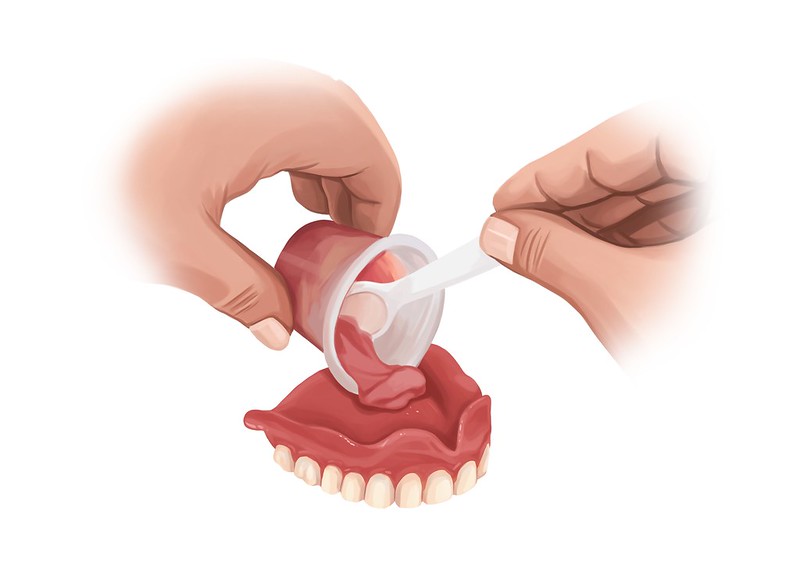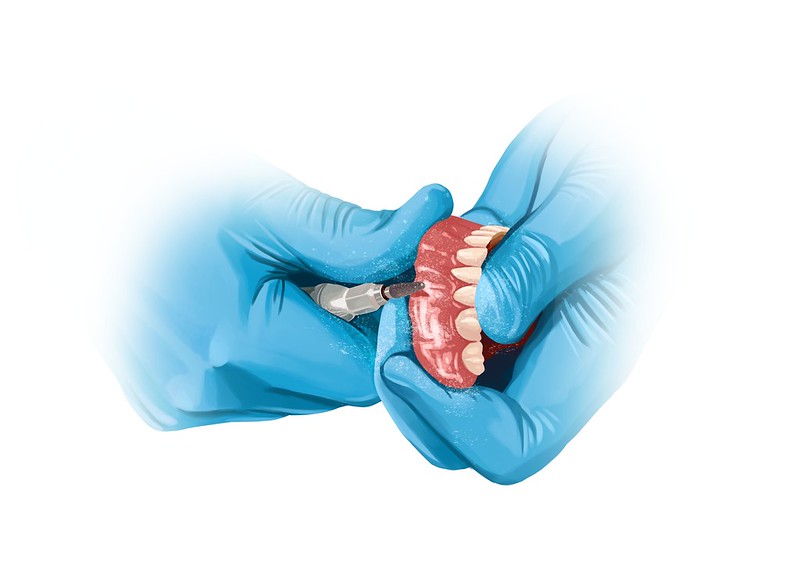If you’re a new denture wearer, you may or may not have heard about “denture relining.” To keep your dentures fitting properly, this needs to be done after some time. Otherwise, it won’t just make eating or talking difficult; it will also cause other oral health problems.
If your denture is ill-fitting, it is definitely not a good idea to use a denture adhesive for a quick, long-term fix. Additionally, some people consider using DIY reline kits to do this on their own in the comfort of their homes. However, again, that’s not a good idea. It’s important that you know about professional relining so you can get the appropriate treatment when necessary.
What Is Denture Relining?
A denture reline is a method of readjusting the base of the denture so that it snugly fits the gums. Essentially, the space between the underside of the denture and surrounding tissue is filled up with additional material. Only plastic dentures can be relined; it’s not possible to reline those with a metal base.

Relining dentures is necessary due to the shrinkage caused by the resorption of alveolar bone following tooth loss. And once the denture becomes loose, it’s important to get it relined because it can cause the following problems:
- Irritation
- Lesions/Mouth sores
- Discomfort
- Pain
- Infection (from entrapment of food and debris)
For this reason, if you notice any signs of an ill-fitting denture, make sure to contact your dentist.
Signs You Need To Get Your Dentures Relined
If you’re experiencing any of the following problems, it’s likely that you need to get your denture relined:
- Difficulty chewing
- Speech problems
- Loose and slipping dentures
- Signs of wear and tear
- Clicking dentures
In general, your dentures won’t feel comfortable inside the mouth. Additionally, make sure to keep an eye out for any signs of gum disease because that’s also a sign of an ill-fitting denture.
What Are The Different Types of Denture Relines?
There are three types of denture relines, which are as follows:
Soft Reline
If your gum tissue is very sensitive, you’ll need a soft reline (your tissue will not tolerate the hard material and get sore). It may also be used if your gum is sore from a recent tooth extraction. Its process is as follows:
- Removing the original soft base of the denture.
- Prepping the base of the denture by removing some of the plastic.
- Applying an adhesive to the base and adding the soft reliner (silicone or acrylic).
- Placing the denture inside the patient’s mouth and allowing the material to set.
- Taking out the denture and “cleaning” it up.

This entire process takes about 30 minutes or so. Just keep in mind that a soft reline is not as durable as a hard reline. So, it would last anywhere from 1 to 2 years, after which you’ll have to get the denture relined again.
Hard Reline
As the name suggests, in a hard reline, a harder material is used to readjust the base of the denture. Usually, polymethylmethacrylate is used for this. And this type of relining can last for as long as 4 years. Its process is as follows:
- Prepping the base of the denture by removing some of the plastic.
- Filling it with a putty-like substance for making an impression.
- Placing the denture in the mouth and letting the putty dry (takes a few minutes).
- Taking out the denture to see where a hard reliner needs to be added.
- Sending the denture to a dental lab for replacing the putty with the hard reliner.
This can take 1-2 days, but sometimes, it can even come back on the same day.
Temporary Reline
A temporary reline is recommended if the gum is sore or inflamed. Essentially, it provides a soft cushion (of soft silicone) between the denture and the gum, allowing it to heal.
Inflammation can result from a variety of factors, such as wearing ill-fitting dentures for too long or even denture stomatitis (fungal infection). Its process is as follows:
- Filling the denture with a temporary reliner.
- Placing the denture inside the mouth of the patient and allowing it to set for a few minutes.
- Taking out the denture and shaving off any excess.
- Putting the denture back in the mouth and letting the material harden over time.
A temporary reliner only lasts for a few weeks, giving your gum tissue enough time to heal and get healthy again. After that, your dentist will either reline (soft or hard) your current denture or replace it entirely if it’s too damaged.
How To Reline Dentures Yourself?
You can reline your dentures yourself, but you’re strongly advised against it because you can end up damaging the denture significantly. It might not even be usable anymore. However, one of the biggest reasons why many people end up using these DIY relining kits is that they’re quite cheap. A lot of them are just under £10.
As far as the instructions for using these kits are concerned, usually, there’s a powder and liquid (which you have to put in the freezer for some time before use), which you have to mix. Using a spatula, you fill the denture with this mixture and place the denture inside your mouth. Once you have a good fit, you clean off the excess stuck to the outside of the denture.
Bad taste aside, there are other more serious issues with the reline kits. For one, it can affect your bite (which can result in a host of problems). As mentioned above, it could damage the denture itself. Many people also complain about the poor adhesion of these kits. At best, it’s a temporary fix, but you need to go to your dentist to get your denture relined professionally.
How Often Do Dentures Need To Be Relined?
A soft denture reline lasts for 1-2 years, and a hard denture reline can last for as long as 4 years. In contrast, if you have dentures immediately following multiple tooth extractions, the size of your jaw will change rapidly, so you’ll need to reline your denture much sooner than usual.
In this case, your dentist may recommend waiting a few months for the gums to heal before taking measurements for a denture.
Also, you may need to get your denture relined much sooner if you don’t take good care of it. Make sure to keep your dentures clean and soak them overnight (so they retain their shape). It’s also important to avoid chewing on hard objects or eating hard, sticky foods. These things can help make your dentures last longer.
How Much Does It Cost To Get Dentures Relined?
You can get your dentures relined on the NHS. It’s a part of the Band 2 dental treatments, which cost £65.20. However, if you choose to get the procedure at a private clinic, it can cost you as much as £150 (for upper or lower dentures).
Although the prices can vary depending on the type of reline (hard reline costs more), the location of the clinic and the qualification/experience of the dentist.
In the US, relining can cost anywhere between $300-600. However, if you have insurance, make sure to check if this procedure is covered by it. There are many insurance plans that do not cover dentures.
What’s The Difference Between Denture Rebasing & Denture Relining?
Although denture rebasing and relining may sound almost the same, they’re quite different. In denture rebasing, the entire base of the denture is replaced by a new one.
Relining, on the other hand, is making modifications to the existing base of the denture. Rebasing is needed when significant changes need to be made to the fit of the denture. It costs about the same amount as denture relining.
Conclusion
Due to the loss of multiple teeth, the jawbone isn’t stimulated enough, which results in its resorption and shrinkage. Therefore, the size of your jaw will inevitably decrease over the years if you’re only wearing dentures. And so you’ll need to get the dentures relined. It’s important that you have a dentist check the fit of your dentures regularly.
On the other hand, if you’re looking for a more permanent solution, you can consider getting dental implants in Turkey. The implants act as tooth root substitutes and can stimulate the jawbone, which will prevent its deterioration. If you’re experiencing problems wearing dentures, you should further discuss its alternatives with a dental professional.
